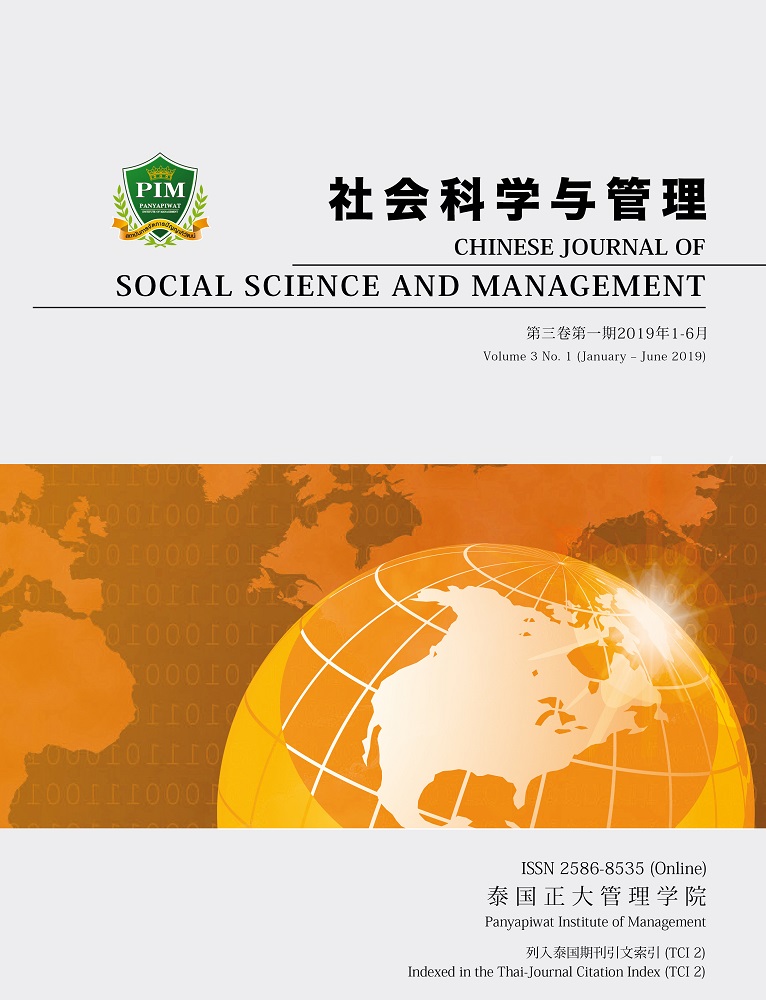THE EFFECT OF STOCK TURNOVER RATE ON THE VALUE CORRELATION OF ACCOUNTING DATA: COMPARATIVE EVIDENCE FROM CHINA A-SHARES AND THAI STOCK MARKET
Main Article Content
Abstract
The main purpose of this study is to find out the differences between China A-shares and the Thai stock market in terms of the influence of stock turnover of the stock market on the value correlation of accounting data, and to provide certain reference for more and more Chinese investors who buy and sell shares in the stock market of Thailand. In this research, the corporate accounting data of Chinese A-shares mainboard-listed companies and the Thai stock market from 2007 to 2016 was adopted. Based on Ohlson residual income model, a comparative study was performed to find out how the turnover rate
in China and Thailand affect the value correlation of accounting data. The research shows that, there are different trends in the two countries in terms of reflection of the listed company’s stock turnover on the
accounting data. The higher the turnover rate of Chinese listed companies, the lower the correlation between accounting data and stock prices; while the higher turnover rate of Thai listed companies, the
higher the correlation between accounting data and stock prices. In the final part, we use the goodness of fit R2 to verify the influence trend of turnover rate on the explanatory power of accounting data on stock price in the two countries.
Article Details
Chinese Journal of Social Science and Management Editorial Division
The Office of Research and Development, Panyapiwat Institute of Management
85/1 Moo 2, Chaengwattana Rd., Bang Talat, Pakkred, Nonthaburi 11120, Thailand
Tel. 02 855 01048 E-mail: cjssm@pim.ac.th
References
Bernard, V. L. (1995). The Feltham–Ohlson Framework: Implications for Empiricists. Contemporary Accounting Research, 11(2), 733-747.
Brennan, M. J., Chordia, T. & Subrahmanyam, A. (1998). Alternative factor specifications, security characteristics and the cross-section of expected stock returns. Journal of Financial Economics, 49(3), 345-373.
Chen, X. Y., Chen, D. H. & Zhu, H. J. (2002). Net assets, residual income and market pricing: correlation of value of accounting information. Financial Research, (4), 59-70. [in Chinese]
Delkhosh, M. (2016). Correlation between accounting information and stock price. Retrieved June 20, 2018, From https://www.researchgate.net/publication/303760577_Correlation_between_accounting_information_and_stock_price
Frankel, R. & Lee, C. M. C. (1996). Accounting diversity and international valuation. Retrieved June 15, 2018, From https://www.researchgate.net/publication/228170590_Accounting_Diversity_and_International_Valuation
Keynes, J. M. (1937). The general theory of employment. The Quarterly Journal of Economics, 51(2), 209-223.
Kothari, S. P. & Zimmerman, J. L. (1995). Price and return models. Journal of Accounting & Economics, 20(2), 155-192.
Lu, G. H. (2012). Stock price overreaction to accounting surplus and capital allocation efficiency. Nankai Business Review, 15(6), 25-33.
Ohlson, J. A. & Juettner-Nauroth, B. E. (2005). Expected eps and eps growth as determinants of value. Review of Accounting Studies, 10(2-3), 349-365.
Ohlson, J. A. (1995). Earnings, book values, and dividends in equity valuation. Contemporary Accounting Research, 11(11), 661-687.
Phansatan, S., Powell, J. G., Tanthanongsakkun, S. & Treepongkaruna, S. (2012). Investor type trading behavior and trade performance: evidence from the Thai stock market. Pacific-Basin Finance Journal, 20(1), 1-23.
Quan, N. T. (2017). The behavior patterns of investors in Thailand stock market. Asian Journal of Finance & Accounting, 9(1), 155-165
Song, X. Z. & Wang, Z. X. (2004). Stock liquidity and asset pricing: empirical analysis based on time series regression. The Theory and Practice of Finance and Economics, 25(6), 43-49. [in Chinese]
Su, D. W. & Mai, Y. X. (2004). Turnover rate and asset pricing: an empirical study based on the turnover rate and expected return of Chinese stock market. Economic Research, (2), 95-105. [in Chinese]
Wang, F. S. & Zhou, W. J. (2007). Empirical research on simplified models of accounting data affecting stock prices. Journal of Management Sciences, 20(2), 74-79. [in Chinese]
Zhang, J. Q., Meng, W. D. & Lu, J. (2006). Comparative analysis of different explanatory power of stock price and value by dividend discount model, free cash flow discount model and residual income model — empirical data from Chinese securities market. Economic Review, (6), 92-98. [in Chinese]


